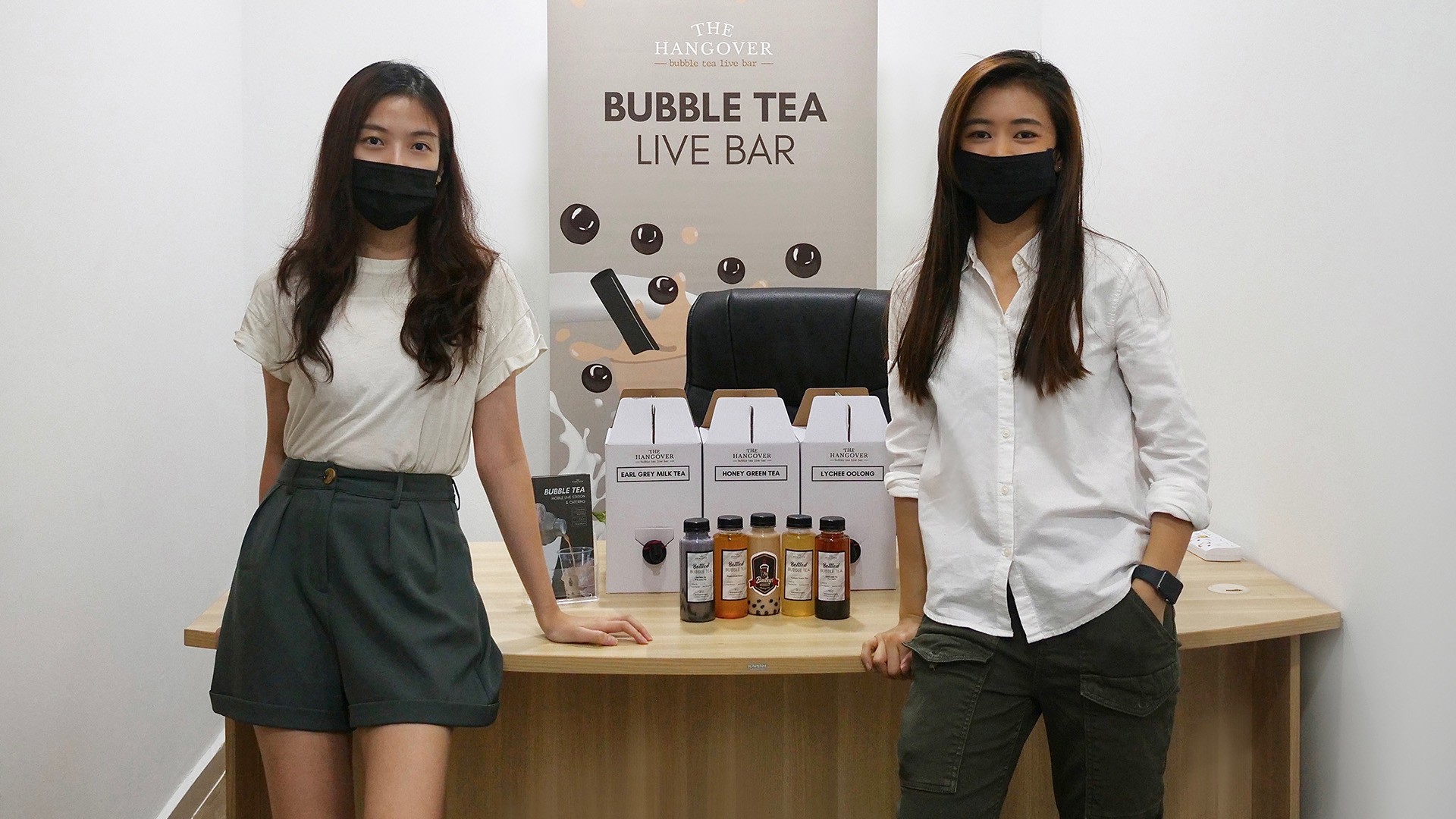No Hangover issues despite pandemic
Unlike most bubble tea businesses which bank on retail in malls, Charis Low and Tan Zhen Ying brought their beverage on a different tangent in early 2019. They would offer it through live stations in large-scale events.
It was a sweet success, breaking even within their first two months and consistently hitting five-figure sales in the first five months. Big names like Facebook, Proctor & Gamble, DHL and Porsche were among their clientele. Their company may be named The Hangover, but clearly this start-up had no such symptoms.
Then, the pandemic struck in early 2020. All large-scale events were cancelled and Charis and Zhen Ying saw their only revenue source evaporate.
“It was an especially difficult time for us,” said Charis.
But the Class of 2020 graduates of NUS Business School were not about to surrender and give up their long-held dreams of being entrepreneurs. The lessons learnt on campus at Kent Ridge had prepared them well for crises.
“We knew we had to pivot our business model in order to survive,” said Zhen Ying, who came up with the live station idea while on internship and noticing a strong demand at corporate events.
How to pivot
But as businesses would share, it is one thing to know that you have to pivot. It is quite another to figure out how to do it.
Thankfully, The Hangover was already working on a new product, one which would blend as seamlessly with home-bound folks as tapioca balls with tea. It is a Bubble Tea DIY Kit, the first to be launched in Singapore.
It allowed bubble tea lovers to make their favourite drink in the comfort and safety of their homes.
As the circuit breaker kicked in last year, and brick and mortar bubble tea stalls were forced to closed, the DIY kits took off. It brought in five-figure sales in those months. The start-up has found its first alternative revenue source.
Encouraged, they pushed on with more new products to suit the new segregated world. First, they launched their Virtual Bubble Tea Making Workshops to go with their DIY kits. The likes of Google and Prudential signed up, eager to find team bonding events in the virtual space.
Second, they created Bottled Bubble Tea and Party Boxes, allowing them to reach smaller groups of as few as 10 people. “These can be easily distributed in office and small-scale parties without compromising on safe distancing measures,” said Charis.
Customers even stock up on the bottles at home, so as to ensure a ready supply of sweet fix. These products led them to secure more corporate clients, such as Holiday Inn, Capella Singapore and Coach, who wanted to offer the drinks during their events.
“With all these new products, The Hangover is currently faring well,” said Zhen Ying.
Beyond the tea
But it was not enough for them. Third, they diversified their business beyond bubble tea by launching Bobaball, a desert concept served through pre-orders and delivery.
Last, they even moved out of F&B altogether, starting an online nailwrap shop which allows customers to do their gel manicures at home, and at a much cheaper price.
“When COVID hit and lockdown restrictions were in place, we realised the need to have a product that is easy to deliver and a fun activity to do at home,” shared Charis. “We wanted to expand into an unrelated field to diversify our offerings.
“Also, nailwraps are a personal interest of mine. It is fun learning how to market products in a totally different field, how to build an e-commerce fashion website, and a great experience overall.”
To be sure, all these moves still have not made up the revenue that had enjoyed in the events market pre pandemic. But at least they have carved out new markets in home consumption and small parties.
“Even though revenue figures are not as high as before, our diversification of products and services had definitely helped keep us afloat,” said Zhen Ying. “Right now, we are holding steady and are continuing to innovate so as to grow further in the future.”
Lessons and support from NUS
They credit such foresight to lessons learnt in NUS. “We were exposed to interdisciplinary modules for the first two years of study, and things we learnt especially in Accounting and Business Law classes proved to be important. Knowing these basics gave us the confidence to start The Hangover in Year 3,” said Zhen Ying.
They urge their juniors to not be afraid to venture into the unknown. “The time when you are in school is the best time to try something new, if there’s always been something you wanted to do!” said Charis.
“If you have a great idea, start small when you’re studying and after you graduate, you can focus fully on it with a loyal customer base ready. Also, school is where you have a great community of friends to support you and lend you a listening ear if you need one. So don’t be afraid and just do it!”





